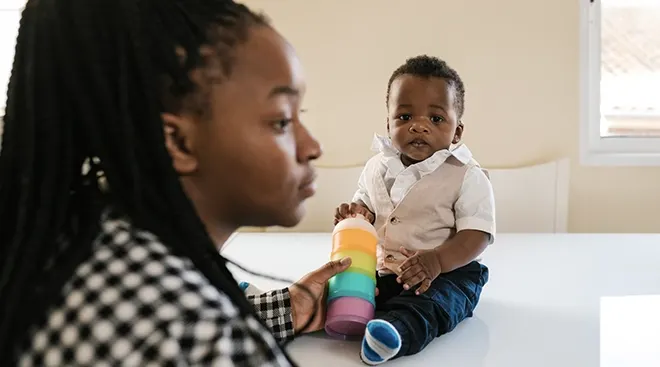How I’m Raising Black Kids in a Post-DEI World
When the Supreme Court struck down affirmative action in 2023, I braced myself for a world where the already limited social resources available to Black families would become even more scarce. I had never believed that false promises of diversity, equity and inclusion would even begin to level the playing field after centuries of enslavement, exclusion and discrimination. But the existence of DEI efforts supported the illusion of a systemic desire to address the ongoing harms of inequity.
Now, as headlines reflect the plot of a dystopian novel, with DEI programs being axed across the government and corporations, it’s time to reexamine how to navigate a world never designed with our full humanity in mind. From personal experience, here’s my advice on dealing with the current moment as a Black parent.
Our nation’s about-face to abandon and sometimes vilify efforts to support all families feels like finding out about a two-faced best friend. We didn’t expect much, but being right was no less painful.
At the same time, I never believed that DEI would create large-scale change. “It was never created for us—it was designed to comfort white-bodied people and help institutions appear progressive without doing the real, ancestral, embodied work of reckoning with harm,” says Jessica Chavira-Eubanks, LCSW-S, CEO and founder of Purple Couch Therapy in San Antonio, Texas. “As a Black mother, I never felt that DEI programs were created for my liberation or my children’s.”
Still, I wonder how gutting these programs will impact opportunity, namely targeted scholarship programs, efforts to diversify educators and the marginal legal recourse we had during instances of racism and discrimination.
“The disappointment is real. But that disappointment is not disempowering. There’s strength in the collective awareness that DEI didn’t save us. That understanding can actually offer a kind of clarity—a buffer,” says Chavira-Eubanks. “It reminds us that our safety and our healing were never going to come from systems built on our exclusion. That kind of clarity helps us protect our energy and re-center our efforts on what actually sustains us: our people, our practices, our knowing.”
The disappointment is real. But that disappointment is not disempowering. There’s strength in the collective awareness that DEI didn’t save us. That understanding can actually offer a kind of clarity—a buffer. It reminds us that our safety and our healing were never going to come from systems built on our exclusion. That kind of clarity helps us protect our energy and re-center our efforts on what actually sustains us: our people, our practices, our knowing.
Maintaining hope that things will improve helps me preserve a sense of humanity in a world that expects Black people, especially Black women and mothers, to constantly be strong. I’m using these moments of expected strength to teach my children lessons about emotional intelligence. I dedicate time to experiencing my feelings alongside my children so they can learn too. I know we’ll need strength for the long battle ahead. But the most important ritual for me is connecting with my children so they have the language, recognition and skill set to navigate a society that consistently gaslights Black people into believing we have overactive imaginations, making racism the boogeyman in the closet.
I’ve taught my children they can live in “both/and”—feel angry we’re in this position and dream up a new world that works better for more people. I also want them to know they can be held by those they love during hard times.
“We don’t have to choose between strength and softness,” Chavira-Eubanks reminds us. “Black parents can hold awareness and vulnerability—those things aren’t opposites. I’d say vulnerability is one of the most radical practices we can model for our children. It says, 'I am human. I feel this. And I still keep going.’”
Like many Black families in mostly white communities, my family has never been able to put faith or expectation of validation in our larger government. After moving to Wyoming, I immersed myself in our local history to understand the local landscape and how race and racism operate in a sparsely populated community. I found lessons within the walls of the archives and hosted local events to highlight these findings: Black folks thrive in community.
Chavira-Eubanks notes that many Black families know that our survival has always been communal, a truth that “didn’t start with DEI and it won’t end with it.” I’m raising my children in this spirit, letting them know our community includes a rainbow coalition of changemakers. Our elders are one of our most significant resources, as they offer examples that we’ve done this before and can do it again. “When we turn to our elders, we find blueprints of resistance that existed long before diversity statements,” she says.
She says that today’s work is reconnecting with community, remembering the spiritual tools our people passed down and building spaces where we can show up in our fullness. “We’ve been here before, and we found a way forward together,” she adds.
What’s in your toolkit is up to you, but Chavira-Eubanks offers the following:
- Private spaces for truth-telling—not everything belongs on social media. Some things deserve sacred protection.
- A relationship with our lineage—knowing who we come from and what they endured gives our children context for their power.
- Ritual—practices that root us: breath, prayer, song, gathering, storytelling.
- A refusal to perform for systems that were never built for us. Our care doesn’t need permission.
She also uplifts individuals like Erin Trent Johnson, founder of Blackmamabody, who creates spaces centering Black mothers through somatic awareness and embodiment.
Informally, I’m developing my post-DEI survival toolkit as well. Strategic rage at harmful systems coupled with internal peace and intentional planning is my formula for impact. It feels more important than ever to be grateful for every moment of love and safety my family has.
Beyond survival plans and strategic social change, the most important thing to me is remembering why I do this work. My love for my children compels me to want a similar existence for everyone they’ll encounter. But I also do it for myself. I deserve a life where I can live authentically and thrive. It’s important to hold my children close and let them know we can celebrate and experience love and joy even in hard times. This world didn’t give it to us and can’t take it away.
“We deserve more than performative change—we deserve liberation,” says Chavira-Eubanks. “And that doesn’t come from initiatives with expiration dates. It comes from us, gathering in truth, in grief and in joy.”
Plus, more from The Bump:
Jessica Chavira-Eubanks, LCSW-S, is the CEO and founder of Purple Couch Therapy in San Antonio, Texas.
Navigate forward to interact with the calendar and select a date. Press the question mark key to get the keyboard shortcuts for changing dates.
Advertisement
Advertisement
Advertisement
Advertisement





















































